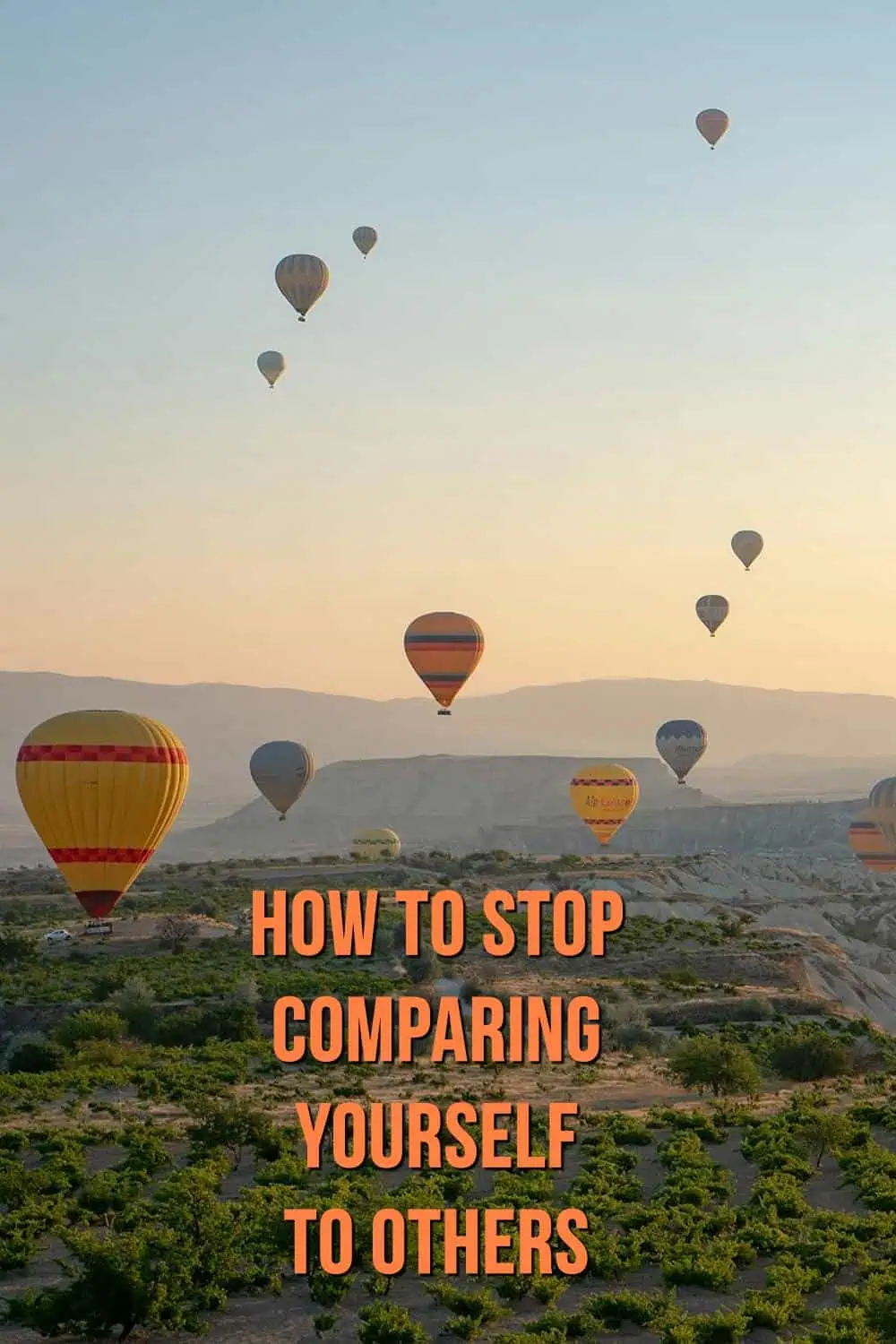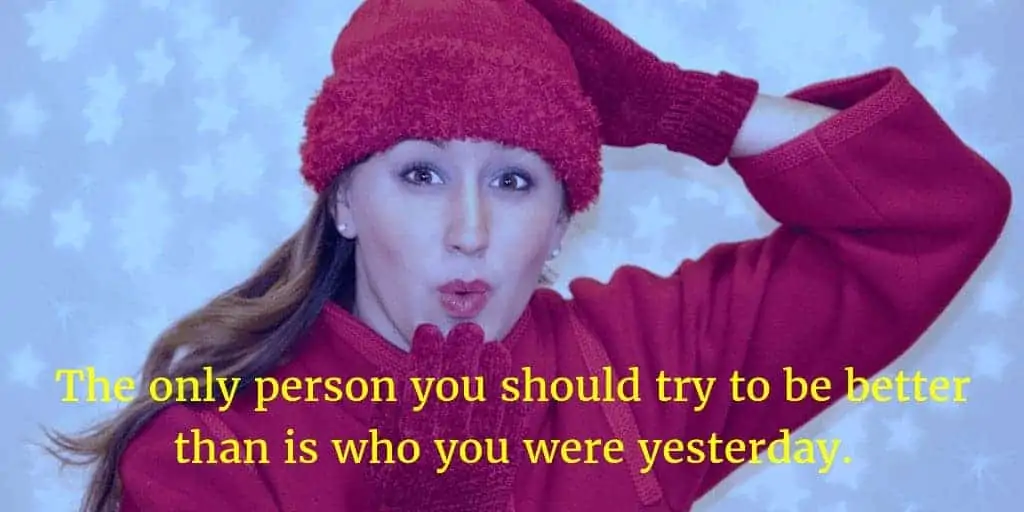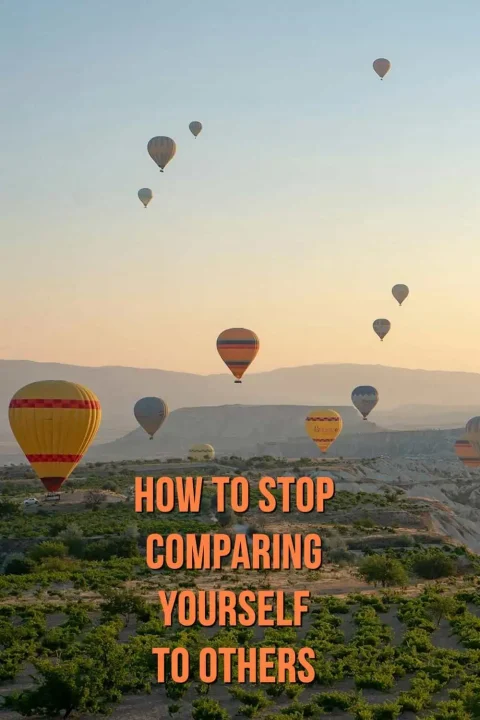Today's Thursday • 6 mins read
— Reviewed by Dr. Sandip Roy.
We should not be comparing ourselves with others. We know it, but we still do it every so often.
So, if you’re still trying to figure out how many followers your friends have on social media as compared to you, it’s time you stopped.
Comparing yourself to others could be killing your happiness. So, how do you stop comparing yourself to others on social media, and in life otherwise?
How To Stop Comparing Yourself To Others
Here are 5 strategies:
1. Measure Yourself With Your Own Yardstick
Judge yourself by your own yardstick. Measure how high you stand against your own standards.
When you set standards for yourself, you give yourself an opportunity to grow and improve.
Instead of comparing yourself to others, focus on your own progress and measure your success against your own goals and aspirations.
This way, you can see how far you have come and where you need to go to achieve your dreams.

2. Realize That Life Is Unfair To All
Realize that life is unfair to all of us in at least some respects. No one is given all, and no one is deprived of all.
It’s easy to get caught up in comparing yourself to others and feeling like you are at a disadvantage.
But the truth is, everyone faces challenges in life, and no one has it all. Instead of focusing on what others have that you don’t, focus on what you do have and how you can make the most of it.
3. Avoid Bringing Others Down
Do not bring down others when you’re talking about them, even when you’re gossiping.
Comparing yourself to others often leads to negative feelings and behaviors, such as gossiping or bringing others down to make yourself feel better.
But these actions only harm yourself and those around you. Instead, focus on positive communication and lift others up, even when discussing their successes.

5. Distract Your Mind Purposefully
Distract yourself from thinking in ruminating cycles about other people’s successes. Force yourself to engage your mind elsewhere.
When you find yourself constantly comparing yourself to others and ruminating over their successes, it can be helpful to distract yourself with other activities.
Engage in hobbies or activities that you enjoy, spend time with loved ones, or focus on personal development.
By shifting your focus, you can break the cycle of comparison and find fulfillment in your own life.
5. Compare Yourself To Past Self
Compare yourself to your past self. This is the best comparison you can ever do for your peace and progress.
Rather than comparing yourself to others, focus on comparing yourself to your past self.
Look back on where you were, how much you have grown, and how much progress you have made.
This can help you see your own personal growth and inspire you to continue working towards your goals. By focusing on your own journey, you can find peace and progress in your life.
While unhappy people compare with others more often, happy people don’t bother themselves with how well others are doing.

Why We Compare Ourselves: A Primal Urge
Humans are wired to compare themselves to others. This isn’t vanity; it’s a deeply rooted survival instinct.
Our hunter-gatherer ancestors lived in groups, demanding social hierarchy for tasks like hunting and childcare. Comparing abilities ensured the fittest filled crucial roles, maximizing the group’s safety and well-being.
Over time, this got passed on down the generations.
Leaders likely dictated early comparisons. Later, sports and contests emerged, offering a more democratic way to identify the strongest, fastest, or most skilled.
This extended to women, who might compete for social recognition in areas like dance or cooking.
The focus eventually shifted from survival to social standing.
We compared wealth, looks, and even spouses, constantly gauging our worth against others. This primal urge to compare fuels modern competition, from prestige contests like Ms/Mr Universe to our everyday desire to “keep up with the Joneses.”
Despite social advancements, our core need to compare socially remains, reminding us of its evolutionary roots.
Psychology of Social Comparison: A Double-Edged Sword
We unconsciously compare ourselves to others, despite knowing it is not the right thing to do. Why?
The Theory of Social Comparison Processes was first proposed by Leon Festinger in 1954, suggesting that as humans, we have a basic drive to understand our self-worth. To achieve this, we compare ourselves to others and try to gain self-knowledge.
- Gauge abilities: We benchmark our skills against others to see where we stand.
- Evaluate opinions: Comparing beliefs helps us understand where we fit socially.
- Identify strengths and weaknesses: This self-assessment helps us target areas for improvement.
- Set standards: Comparisons establish criteria for judging ourselves.
- Motivate ourselves: Seeing others succeed can inspire us to improve.
We compare ourselves to find out where we do better and feel better about ourselves, and where we need to improve. However, we mostly tend to compare ourselves to similar others (nearly the same age, gender, and social status), creating realistic benchmarks.
Wert and Salovey (2004) concluded that all gossip involves social comparison. They further say that around 60% of our talks with others involve gossip.
Aggressive gossipers, as a rule, compare themselves with less fortunate people to feel better. This is a downward comparison.
Workplace gossip can be a tool of manipulation and is often the reason for premature resignations, leadership failures, and rampant animosity (Hallet, 2009).
White and Langer in their paper The Dark Side of Social Comparisons say that people who compare themselves often are more likely to experience —
- envy,
- guilt,
- regret,
- defensiveness, and
- more unfulfilled cravings.
The frequent ‘comparers’ also tend to tell lies and blame others more. So, stop comparing yourself to others.
Sonja Lyubomirsky, positive psychology researcher, and author of The How of Happiness, points out, happy people pay less attention to social comparisons. Meanwhile, unhappy people linger on comparisons. This dents their self-esteem and makes them even more unhappy.
There exists, in the human organism, a drive to evaluate his opinions and abilities.
— Festinger

3 Reasons To Stop Comparing Yourself
Don’t answer the obvious. Instead, read on to find out why you should stop:
- It’s a Deflating Delusion: Social media portrays a highlight reel, not reality. You’re comparing your behind-the-scenes life to someone else’s carefully crafted best moments. It’s a recipe for discouragement. Focus on your own journey, not someone else’s curated vacation.
- It Strains Relationships: Constant comparisons can make you feel envious and resentful, damaging your connections with friends and family. Comparing can also make others feel inadequate and erode trust.
- Gossip is a Poisoned Arrow: Comparing often bleeds into gossiping – talking about others’ mishaps and advantages. Gossip, especially the downward kind (comparing yourself to those “worse off”), might give a temporary ego boost, but it weakens trust and breeds negativity.
How to focus away from comparing yourself to others? Simple: focus on your own happiness.
“A flower does not think of competing with the flower next to it, it just blooms.” — Zen Shin
• • •
√ Also Read: 7 Signs You Might Have Become Toxic
√ Please spread the word if you found this helpful.
• Our Story!
